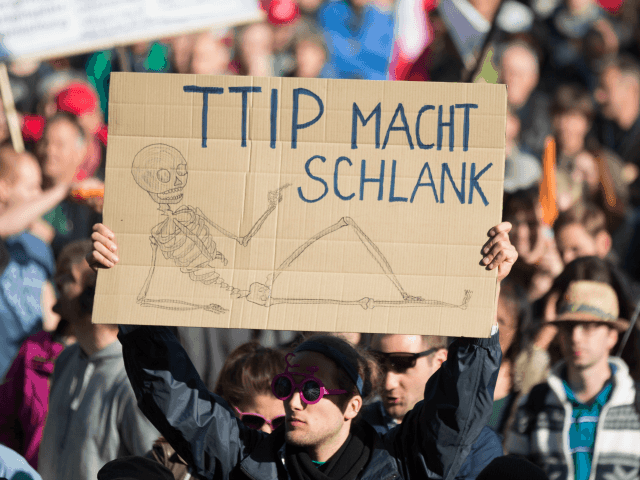American and European Union (EU) negotiators are rushing to complete the controversial Transatlantic Trade and Investment Partnership (TTIP) deal before Barack Obama leaves office, as fears increase the deal will be delayed another two to three years, or even collapse completely, once a new U.S. President is sworn in.
Breitbart London has reported on fears the deal will erode democracy, giving effective power of veto to big business over national laws, as well as threatening Britain’s National Health Service (NHs) with a “myriad of dangers”.
Now it is looking increasingly likely negotiators may try to rush it through as soon as possible.
John Emerson, the US ambassador to Germany, told news site Politico.EU: “If you really want this, it needs to be completed during this (U.S.) presidency.” He said that whoever wins November’s election will “want to put their impact” on TTIP, thus potentially stalling talks even further.
“The other issue is, it isn’t just the American election,” he added. “You get into the French elections and then the German election. Those push the process out.”
Last week, German chancellor Angela Merkel, along with the heads of the World Trade Organisation, International Monetary Fund and the World Bank issued a joint statement saying they “expect significant progress in the negotiations on a Transatlantic Trade and Investment Partnership in 2016.”
Luisa Santos, director for international relations at BusinessEurope, the EU’s main business lobby, said: “The Americans are using their presidential elections to not move on any topics that are sensitive for them, but we knew from the start this would come up. It’s not fair to hide behind an election now.”
If trade talks are not concluded in the coming months, there may not realistically be a deal before 2018 or 2019, according to Hosuk Lee-Makiyama, director of European Centre for International Political Economy.
“Whoever will be the next [U.S.] president, we’re looking deep into 2017 before they come to bother about trade,” he said. “It’s not difficult, it’s simply impossible.”
Even if the next American President decides to push ahead with TTIP as soon as possible, France and Germany, the EU’s two biggest powers, will go to the polls next year in elections that could see a Eurosceptic backlash in both countries.
In France, the Front National led by Marine Le Pen is riding high in the polls, with some predictions even indication Ms Le Pen could come first in the preliminary round of the presidential elections.
Germany will then go to polls later in 2017 with Angela Merkel facing a growing challenge from the insurgent Eurosceptic Alternative for Germany (AfD) party. According to a Eurobarometer survey last year, only 27 per cent of Germans support TTIP.
Campaigning politicians may also be reluctant to commit to specifics in the TTIP talks in case they are seen to have ceded ground, and thus lose votes.
“Every TTIP round attracts the attention of critics, we know that,” an EU official said. “We try to be as transparent as possible, but such negotiations always include some element of secrecy.”
Sven Giegold, an MEP from the German Green party, said: “Germans are not against trade in general, but they oppose restrictions imposed by TTIP that could infringe on democracy.”
“We see the deal in its current state as a risk to our society’s standards. If they don’t change the approach, which frankly I can’t see at the moment, this will become an issue in the German elections as well as in other European countries.”
Source: Bretibart

